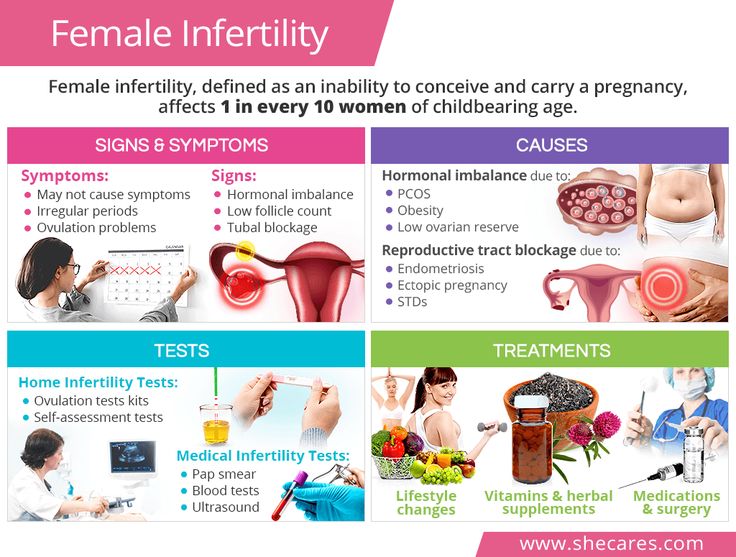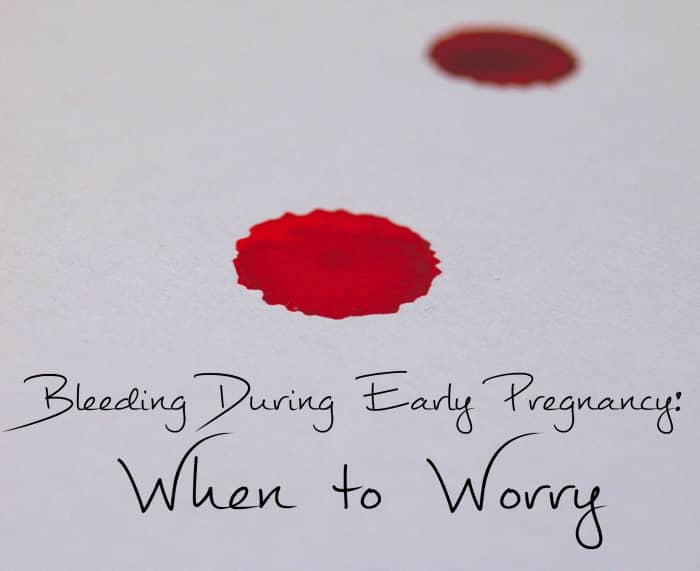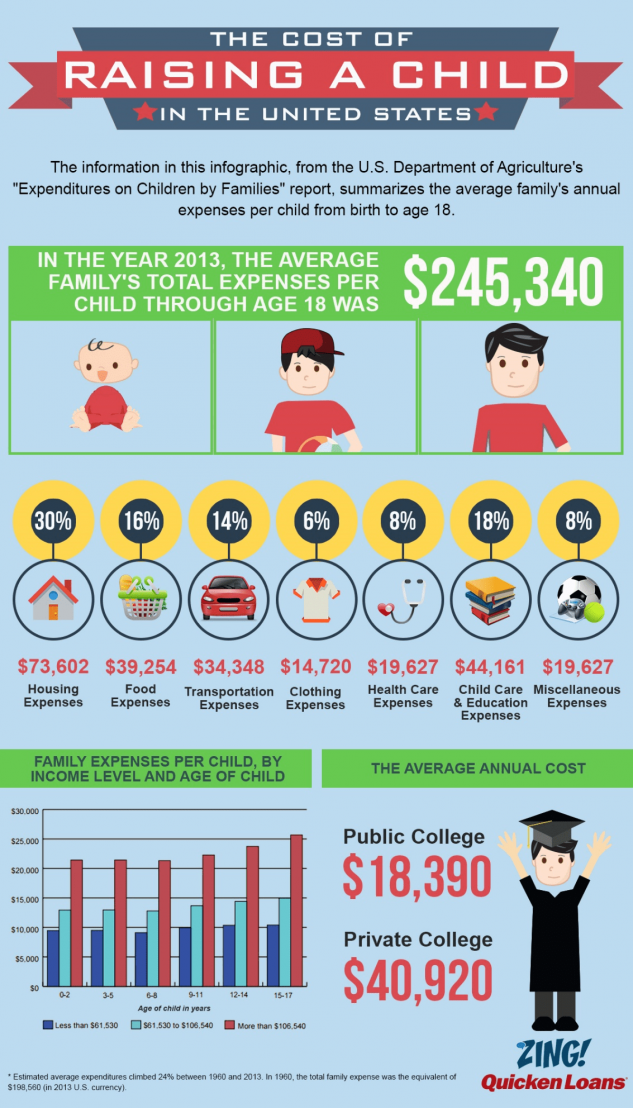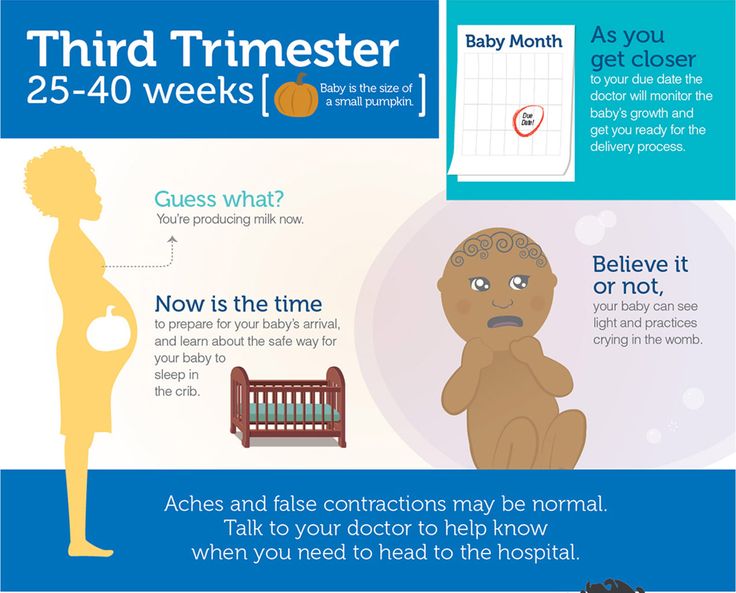Pcos conception tips
Top tips on how to get pregnant with PCOS quickly
Whatever your reason, whether it is advancing age or just excitement, most people don’t want to spend months taking pregnancy tests when trying to get pregnant. If you have been diagnosed with polycystic ovary syndrome (PCOS), then you will know that it can take longer for some women with PCOS to get pregnant. To give yourself the best possible chance of getting pregnant fast with PCOS, read on for some quick tips.
Reverse any insulin resistance
Women with PCOS have problems with insulin resistance, which means that your blood sugar levels are elevated, as is your insulin level, this increases your risk of having trouble conceiving. Doctors can prescribe Metformin to help, but there are many side effects to this drug to consider. (1) In the first instance, try cutting out sugar and refined carbs from your diet and making sure you get enough protein, fibre and healthy fats and you will see your blood sugar levels and your insulin level drop. Myo-inositol has been proven effective in treating insulin resistance in some PCOS women. (2) The new InofolicAlpha, which contains both myo-inositol and alpha-Lactalbumin, can help reverse insulin resistance even more effectively.
De-stress
Your fertility depends on balanced hormones and nurtured adrenals, but the stress hormone, cortisol, produced by your adrenal glands affects all your hormones. So by actively reducing and preventing any stress you can increase your chances of getting pregnant. Try meditation, massage, yoga, exercise, spending time with animals or socialising — whatever makes you happy!
Follow an anti-inflammatory diet
Diet plays a big part with increasing fertility and helping manage PCOS symptoms. (3) The wrong foods can throw your hormones into disarray. Women with PCOS can experience higher inflammation due to higher androgens which in turn encourage more insulin production. Higher insulin levels contribute to weight gain which only causes more inflammation — a vicious circle!
Diet can also cause inflammation which can bring on oxidative stress to stimulate an inflammatory response.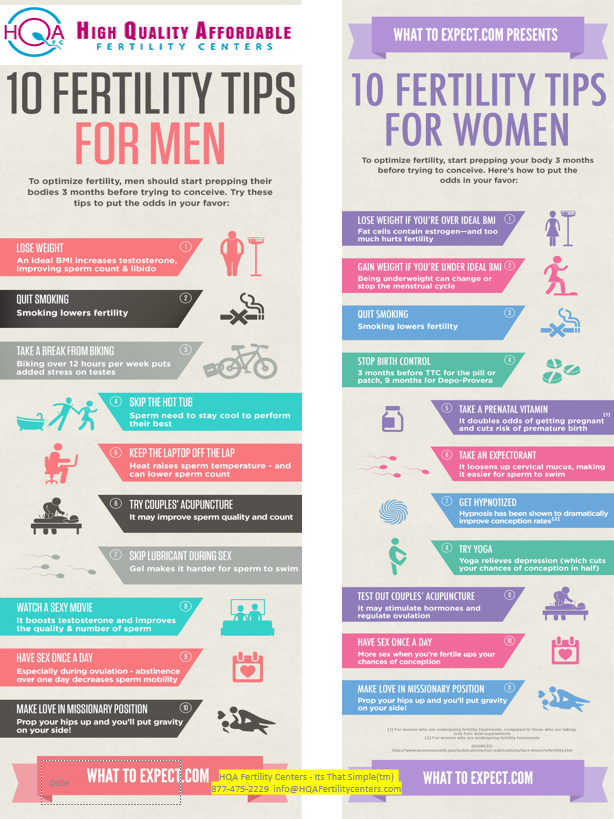
An anti-inflammatory diet will nourish and heal your body by balancing your hormones and blood sugar and helping you to lose weight if needed. An anti-inflammatory diet can include:
- Limiting red meat
- Avoiding sugar
- Swapping your daily tea or coffee for green tea
- Eating omega-3 rich fish several times a week (salmon or tuna for example)
- Eating plenty of fruit and vegetables
- Using herbs and spices when cooking (ginger, cumin, fennel, bay leaves etc)
- Consuming unsaturated sources of fat (such as nuts, seeds, olive oil)
- Including beans in your diet (at least once a week)
Track your menstrual cycle
If you track your cycles you will begin to understand when you’re ovulating and where your fertile window falls, so that you can hit the exact four days in the month to try for a baby.
Confirm ovulation with test strips
To find out when you are ovulating, you can buy ovulation kits from your local pharmacy which work much the same way as a pregnancy test.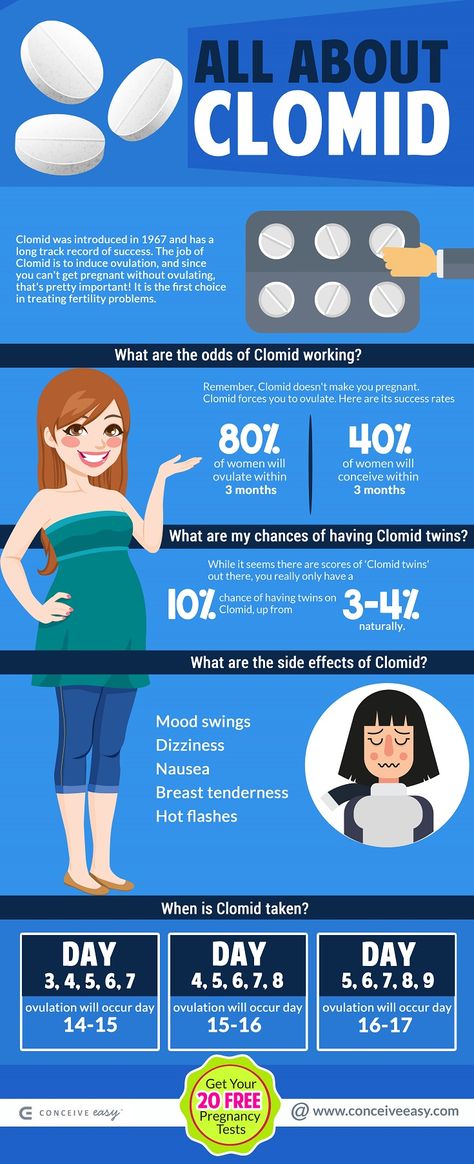 Make a note of when you ovulate each month so that you can find out how regular your ovulation is.
Make a note of when you ovulate each month so that you can find out how regular your ovulation is.
Start taking Inofolic Alpha immediately
Something you can do right away is start taking InofolicAlpha. For women with PCOS who have insulin resistance, treatment with PCOS supplements, such as InofolicAlpha has been proven to make significant improvements to hormone levels, reduce acne and excessive hair growth, restore and regularise periods and reduce blood pressure.
In order to get pregnant quickly with PCOS not only do you need to ovulate, but you also need to ovulate good quality eggs. A doctor can offer you medication to trigger ovulation or injectable hormones — but until the eggs and sperm are good quality these treatments are not necessarily an immediate solution.
The alpha-lactalbumin in Inofolic Alpha helps reduce inflammation, part of the underlying pathology of PCOS.
To see how Inofolic Alpha has helped women with PCOS, have a read of our real life success stories.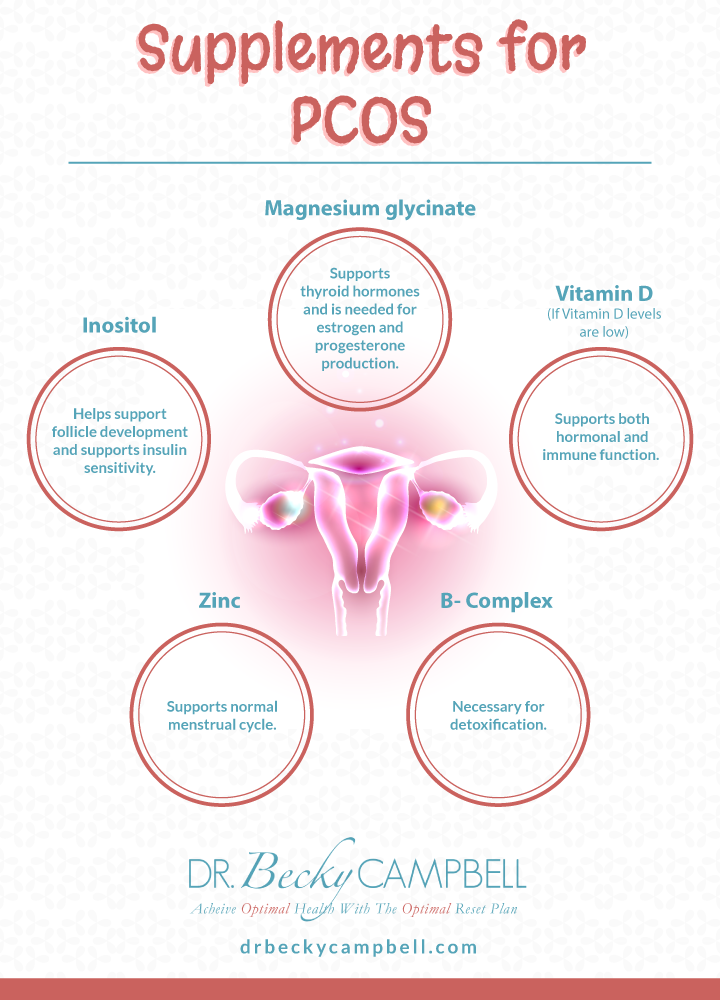
The sooner you start taking InofolicAlpha, the sooner your body will feel the benefits.
Start your journey with Inofolic Alpha today
Sources
Faghfoori Z, Fazelian S, Shadnoush M, Goodarzi R. Nutritional management in women with polycystic ovary syndrome: A review study. Diabetes Metab Syndr. 2017 Nov;11 Suppl 1:S429-S432. doi: 10.1016/j.dsx.2017.03.030. Epub 2017 Apr 5. PMID: 28416368.
Nawaz FH, Khalid R, Naru T, Rizvi J. Does continuous use of metformin throughout pregnancy improve pregnancy outcomes in women with polycystic ovarian syndrome? J Obstet Gynaecol Res. 2008 Oct;34(5):832-7. doi: 10.1111/j.1447-0756.2008.00856.x. PMID: 18834342.
Kamenov Z, Kolarov G, Gateva A, Carlomagno G, Genazzani AD. Ovulation induction with myo-inositol alone and in combination with clomiphene citrate in polycystic ovarian syndrome patients with insulin resistance. Gynecol Endocrinol. 2015 Feb;31(2):131-5. doi: 10.3109/09513590.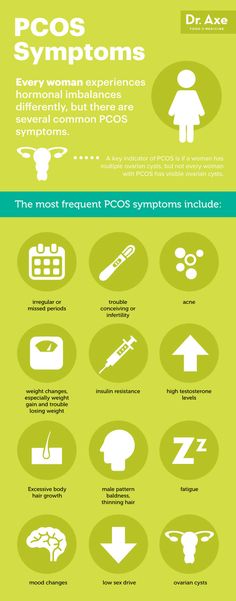 2014.964640. Epub 2014 Sep 26. PMID: 25259724.
2014.964640. Epub 2014 Sep 26. PMID: 25259724.
This article has been reviewed by Dr Gillian Lockwood FRCOG, DPhil, MA (Oxon)
Consultant fertility specialist Dr Gillian Lockwood has a special interest in Polycystic Ovarian Syndrome (PCOS) and age-related infertility. Gillian has published widely on all aspects of fertility and has extensive knowledge in the area of reproductive medicine.
Other interesting topics
5 Tips To Boost Fertility And Get Pregnant With PCOS: University Reproductive Associates (URA): Reproductive Endocrinologists
5 Tips To Boost Fertility And Get Pregnant With PCOS: University Reproductive Associates (URA): Reproductive EndocrinologistsMany women with polycystic ovary syndrome (PCOS) have concerns about getting pregnant. PCOS is one of the most common conditions in women struggling with infertility. Women with this condition have higher levels of male hormones called androgens.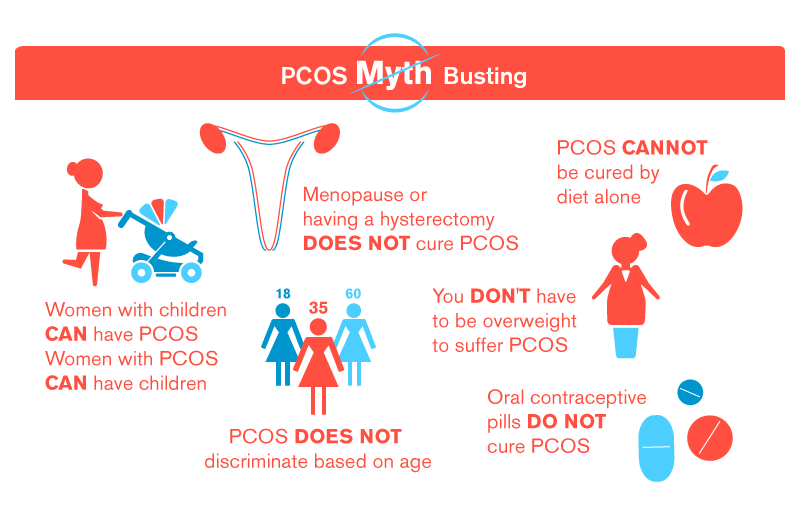 This hormonal imbalance can interfere with ovulation. Although having PCOS may make getting pregnant more challenging, there are ways women can boost fertility.
This hormonal imbalance can interfere with ovulation. Although having PCOS may make getting pregnant more challenging, there are ways women can boost fertility.
-
MEDICATIONS MAY BE NEEDED
High levels of androgens can interfere with healthy ovulation. If a healthy egg is not released during ovulation, then a woman will not be able to get pregnant. Many women who have PCOS are not able to get pregnant without the help of ovulation medications. These medications can help a woman ovulate to get pregnant. Women can work with a healthcare provider or fertility specialist to find the right dose and type of medication that works best.
-
FIND YOUR HEALTHY WEIGHT
Many women find that losing just 10% of body weight can improve hormones and ovulation. Even only a 5% reduction in body weight can improve a woman’s menstrual cycle, insulin resistance, and overall fertility. One study found that women who exercised regularly had a 5% lower risk of infertility than those who didn’t exercise at all.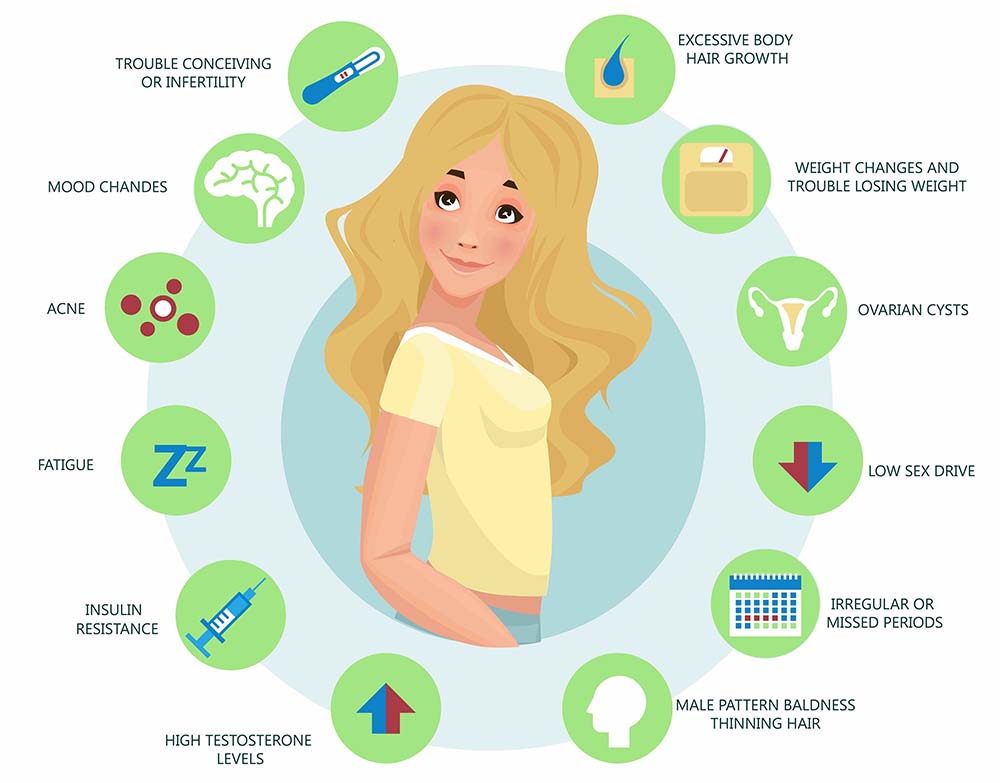 However, overexercising can raise levels of inflammation in the body, which is detrimental to fertility. For best results, aim to exercise at moderate intensity 3-5 days per week.
However, overexercising can raise levels of inflammation in the body, which is detrimental to fertility. For best results, aim to exercise at moderate intensity 3-5 days per week.
-
REDUCE STRESSORS
When dealing with infertility, keeping stress at bay can be a challenge. But long-term stress can have a negative impact on hormones and fertility. Too much stress leads to higher levels of cortisol, which may trigger an increase in insulin. People who struggle with feeling stressed may benefit from talk therapy, meditation, exercising, or connecting with loved ones.
-
TRY ASSISTED REPRODUCTIVE TECHNOLOGIES
If ovulation medications don’t improve fertility, women may benefit from assisted reproductive technologies (ART) like in vitro fertilization (IVF). Studies have found that women with PCOS who undergo IVF treatment have the same rates of success as women without the condition. Typically, doctors will start with medications and lifestyle changes to boost fertility and will recommend ART as an option if these interventions aren’t successful.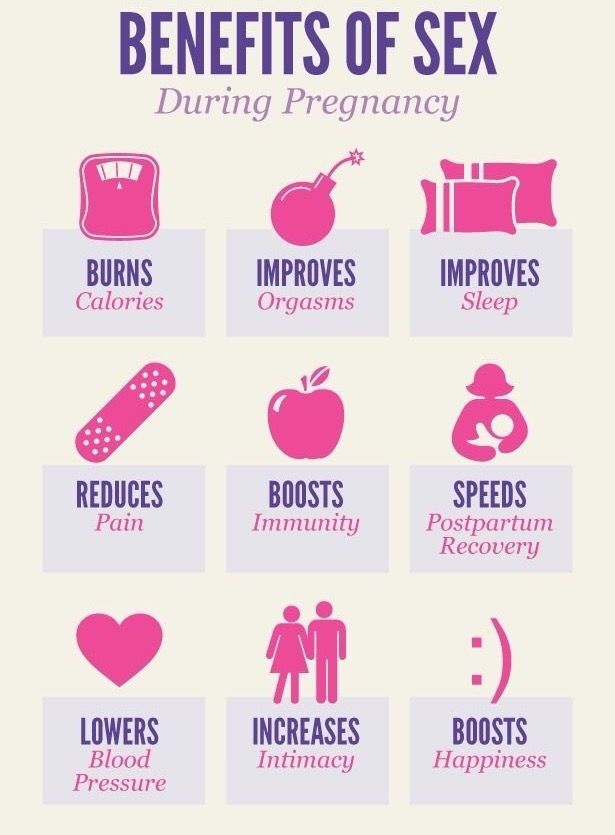
-
SURGICAL OPTIONS
If other treatment options are unsuccessful, there are surgical procedures available for women with PCOS to boost fertility. One surgery called ovarian drilling is a treatment to trigger ovulation. Though ovarian drilling is not always necessary, research has found that up to 50% of women who get ovarian drilling are able to get pregnant within the first year after the surgery.
DON’T LOSE HOPE
PCOS affects almost 10% of women in the United States. Though the condition can make pregnancy more complicated, having a baby is not impossible and women should not lose hope. Women with PCOS who want to become pregnant can consult with a healthcare provider for diagnoses and treatment options.
2 Ways to Induce Ovulation
When infertility issues arise, your brain may immediately rush to solutions, such as surrogacy or adoption.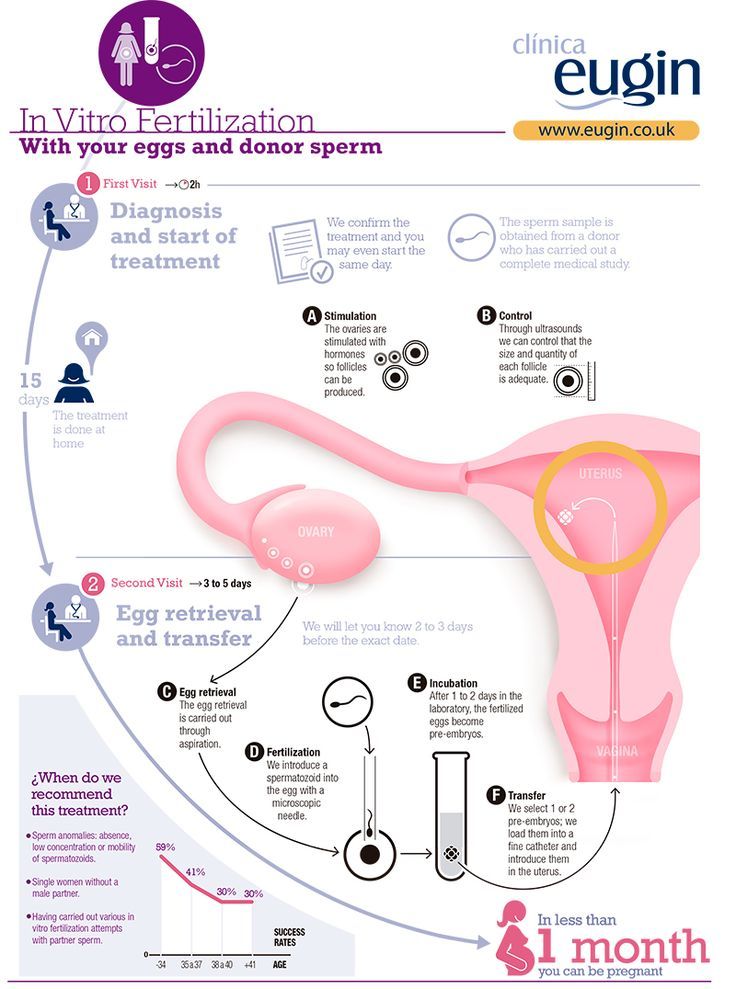 There are other solutions — ovulation induction could be all you need to get pregnant. Read on to learn more.
There are other solutions — ovulation induction could be all you need to get pregnant. Read on to learn more.
Does Endometriosis Resolve on Its Own?
Endometriosis is an under-researched and chronic condition that affects millions of women. Getting a diagnosis can be difficult, and obtaining treatment can feel even harder. Read on to learn if endometriosis can resolve on its own.
What's Making Me Gain Weight?
When diet and exercise can’t seem to stop weight gain, it’s time to look deeper for a more insidious cause. For women, that can mean the reproductive system. Read on to learn more.
How to Manage the Skin Symptoms of PCOS
Is PCOS affecting your skin? Many women find that the visible side effects of PCOS are apparent on their faces and bodies.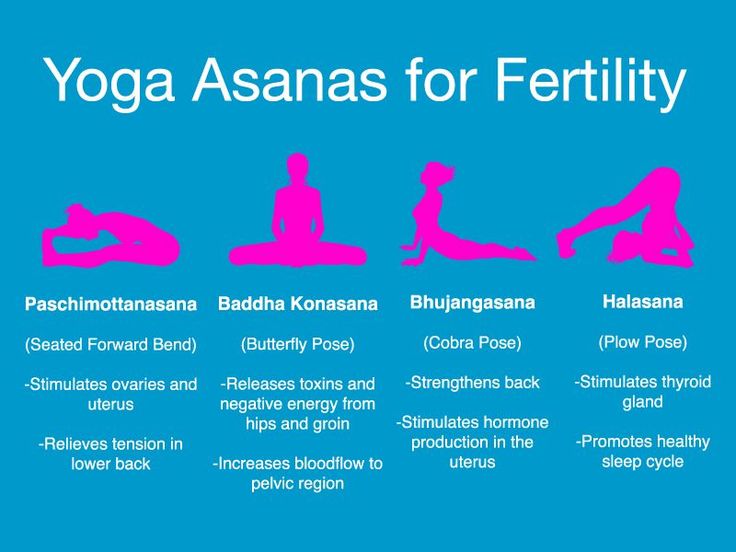 Fortunately, there are solutions that can help. Read on to learn more.
Fortunately, there are solutions that can help. Read on to learn more.
5 Encouraging Facts About IVF
Have you had trouble conceiving? Or are you desiring to become pregnant without a partner or with a same-sex partner? In vitro fertilization (IVF) could be right for you. Read on to learn more.
How to get pregnant with polycystic ovaries?
Polycystic disease is a common hormonal disease that affects the functioning of a woman's ovaries. The dangers of PCOS include irregular menstrual periods, excessive hair growth, acne, weight gain, and other problems. Left untreated, PCOS can even lead to infertility. In this article, we will tell you more about causes of polycystic , polycystic ovaries and pregnancy , and also give an answer to the question: “ Is it possible to give birth with polycystic ovaries? ".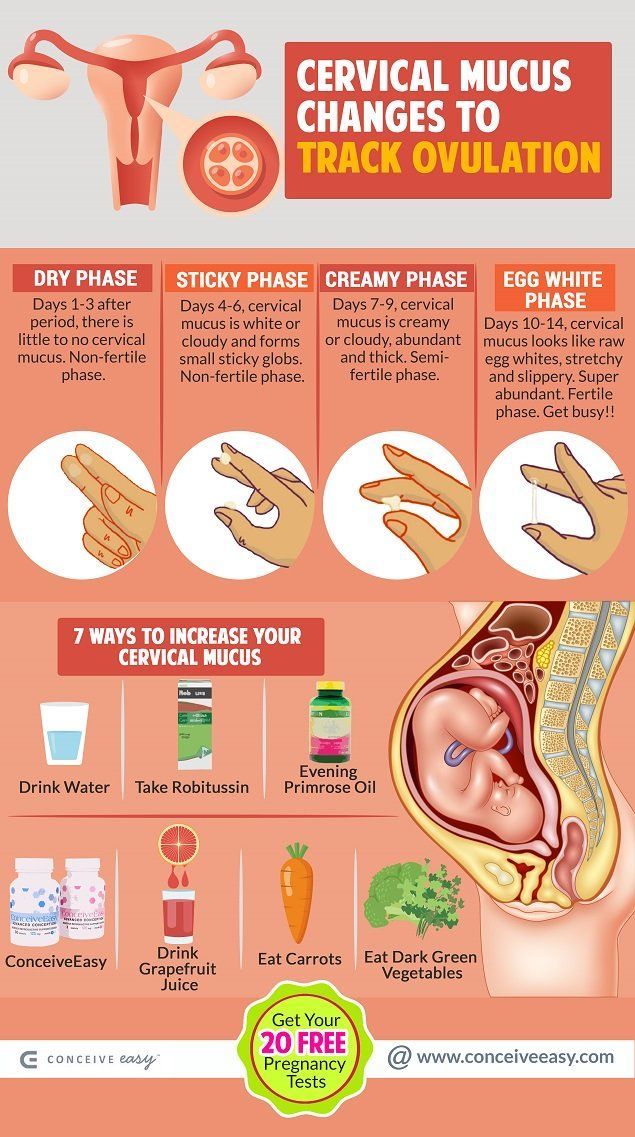
What is polycystic ovary syndrome?
Polycystic ovary syndrome (PCOS) is a hormonal disorder common among women of reproductive age. Women with PCOS may have menstrual irregularities and elevated levels of male hormones (androgens). Numerous small collections of fluid (follicles) may form in the ovaries, and an egg may not be released regularly. This condition should not be confused with multifollicular ovaries, because with multifollicular ovaries, ovulation and a normal menstrual cycle can persist, unlike polycystic disease. nine0019
50-75% of cases of endocrine infertility. 20-22% of marital infertility. It is detected in 5-16% of women of reproductive age. These are the figures for the diagnosis of "Polycystic Ovary".
Symptoms of polycystic ovary syndrome
Polycystic ovary syndrome is accompanied by characteristic symptoms, upon noticing which it is necessary to seek advice from an endocrinologist or gynecologist. For some women, symptoms begin around the time of their first menstrual period. Others discover symptoms of PCOS only after they have gained a lot of weight or have problems getting pregnant. In some cases, PCOS may be asymptomatic. nine0019
Others discover symptoms of PCOS only after they have gained a lot of weight or have problems getting pregnant. In some cases, PCOS may be asymptomatic. nine0019
The most common symptoms of PCOS:
- Irregular periods. Lack of ovulation prevents the lining of the uterus from falling off every month. Some women with PCOS have fewer than eight periods a year, or none at all.
- Severe bleeding. The lining of the uterus builds up over a longer period of time, so menstruation may be heavier than usual.
- Hair growth . More than 70 percent of women with this condition grow hair on their face and body, including on their back, abdomen, and chest. Excess hair growth is called hirsutism.
- Acne . Male hormones can make the skin more oily than normal and cause breakouts on areas such as the face, chest, and upper back.
- Weight gain. Up to 80 percent of women with PCOS are overweight or obese.
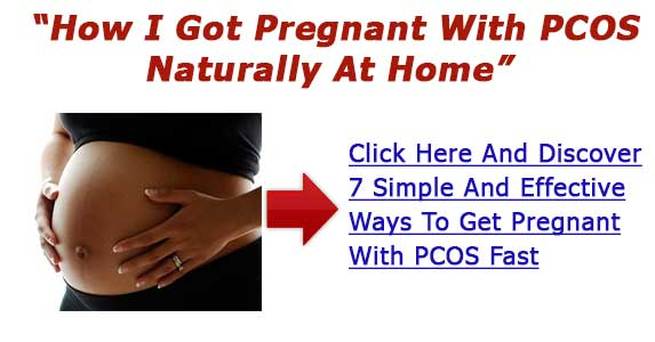
- Male pattern baldness. nine0039 The hair on the scalp becomes thinner and may fall out.
- Darkening of the skin. Dark patches of skin may develop in body folds, such as the neck, groin area, and under the breasts.
- Headaches. Hormonal changes may cause headaches in some women.
Irregular periods
Infrequent, irregular periods, long or no periods are the most common symptom of PCOS. For example, with PCOS, you may have fewer than nine periods a year, more than 35 days between periods, and abnormally heavy periods. nine0019
Hyperandrogenism
Hyperandrogenism is a disease characterized by high levels of androgens. It is more common in women than in men. Symptoms of hyperandrogenism may include acne, seborrhea (inflammation of the skin), hair loss on the scalp, increased body or facial hair, and infrequent or absent periods.
Hyperandrogenism is a defining feature of women and young girls with PCOS.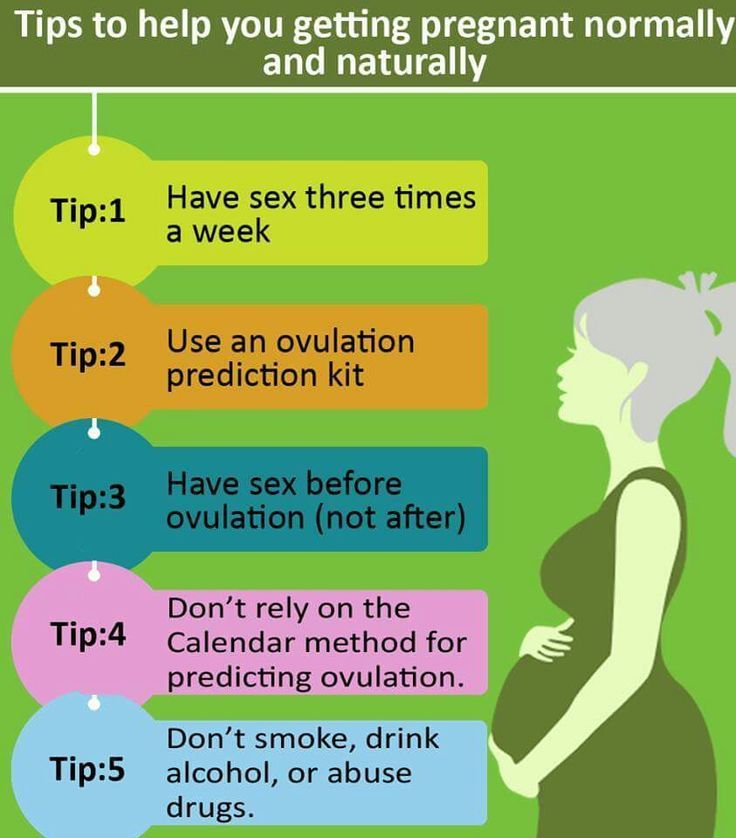 Polycystic disease causes a malfunction of the ovaries or adrenal glands, which leads to the production of excess androgens (male sex hormones). nine0019
Polycystic disease causes a malfunction of the ovaries or adrenal glands, which leads to the production of excess androgens (male sex hormones). nine0019
Anovulation
Anovulation occurs when an egg is not released from the ovary during the menstrual cycle. The egg is essential for pregnancy. Since several hormones are involved in ovulation, there are many causes of anovulation, one of which is PCOS. Chronic anovulation is a common cause of infertility.
Diagnosis
There is no test to definitively diagnose polycystic ovary syndrome (PCOS). The doctor will likely begin by discussing your medical history, including menstrual periods and weight changes. A physical exam will include checking for signs of excessive hair growth, acne, and weight gain. nine0019
Your doctor may recommend:
- Gynecological examination. A physician visually and manually examines the reproductive organs for growths or other abnormalities.
- Blood tests.
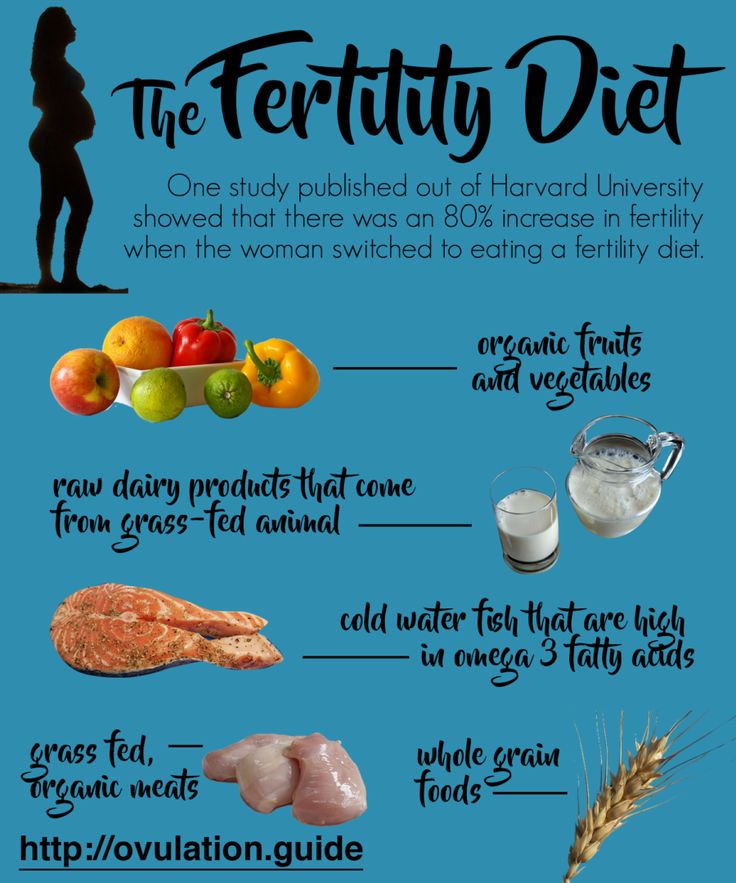 A blood test is given to determine the level of hormones. This will help rule out possible causes of menstrual irregularities or excess androgens that mimic PCOS. An additional blood test may also be needed to measure insulin resistance as well as fasting cholesterol and triglyceride levels. nine0041
A blood test is given to determine the level of hormones. This will help rule out possible causes of menstrual irregularities or excess androgens that mimic PCOS. An additional blood test may also be needed to measure insulin resistance as well as fasting cholesterol and triglyceride levels. nine0041 - Ultrasound examination (ultrasound). The doctor will check the appearance of the ovaries and the thickness of the lining of the uterus. A rod-shaped device (sensor) (transvaginal ultrasound) is inserted into the vagina, which emits sound waves and converts them into images on a computer screen.
Is it possible to get pregnant with PCOS
How to get pregnant with PCOS? Getting pregnant with PCOS can be difficult, but that doesn't mean it's impossible. While PCOS can affect your hormones and therefore your fertility, there are medical treatments and lifestyle changes you can make to improve your chances of pregnancy. nine0019
Is it possible to get pregnant with polycystic ovaries? To get pregnant, you must ovulate, which PCOS most often prevents. Women who do not ovulate regularly with PCOS do not release enough eggs for fertilization. Pregnancy with PCOS is further complicated by the fact that PCOS causes a hormonal imbalance that changes the quality of cervical fluid, making it difficult for sperm to survive.
Women who do not ovulate regularly with PCOS do not release enough eggs for fertilization. Pregnancy with PCOS is further complicated by the fact that PCOS causes a hormonal imbalance that changes the quality of cervical fluid, making it difficult for sperm to survive.
It is impossible to say categorically that PCOS is infertility, but PCOS is one of the main causes of infertility in women. nine0019
Is it possible to get pregnant with PCOS? And although there are no exact statistics on the chances of pregnancy, 70 to 80 percent of women with PCOS have fertility problems. PCOS disrupts the normal menstrual cycle and makes it difficult to conceive.
Is it possible to get pregnant with PCOS? Polycystic ovary syndrome is not a sentence and it is possible to get pregnant, albeit problematic. However, if PCOS is left untreated, the chances of getting pregnant decrease with age.
It is possible to get pregnant with polycystic disease, but most often pregnancy with polycystic disease is difficult.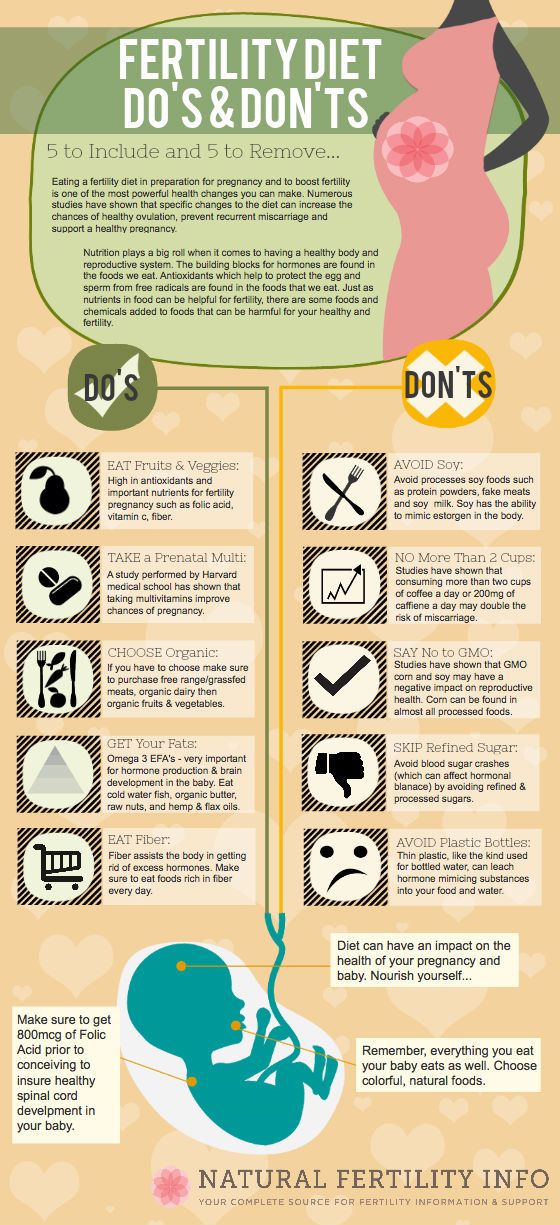 This condition can increase the risk of pregnancy complications. Women with PCOS are twice as likely to have a preterm birth than women without. They are also at greater risk of miscarriage, high blood pressure, and gestational diabetes. However, by managing the symptoms, many women with PCOS can become pregnant and have a healthy baby.
This condition can increase the risk of pregnancy complications. Women with PCOS are twice as likely to have a preterm birth than women without. They are also at greater risk of miscarriage, high blood pressure, and gestational diabetes. However, by managing the symptoms, many women with PCOS can become pregnant and have a healthy baby.
How to get pregnant with PCOS? Women with PCOS can become pregnant using fertility treatments that improve ovulation. Losing weight and lowering your blood sugar can increase your chances of a healthy pregnancy. nine0019
Pregnancy planning for PCOS
How to get pregnant with PCOS? While your chances of getting pregnant with PCOS may be lower, there are a few things you can do to increase those chances.
- Call your doctor. How to get pregnant with polycystic ovaries? Normalization of hormones and menstruation is the first step. Your doctor may prescribe medications to help your body deal with insulin better and regulate your menstrual cycle.
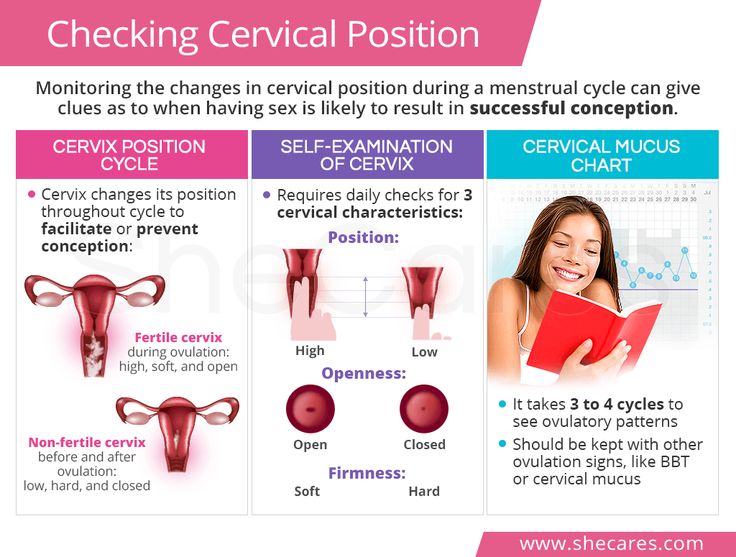 nine0039
nine0039 - Maintain a healthy weight. Is it possible to get pregnant with PCOS? Weight loss can lower insulin levels, androgen levels, and restore ovulation. Ask your doctor about a weight management program and meet with a nutritionist regularly for help with your weight loss goals.
- Eat right. Polycystic Ovarian Diet includes sugary foods, simple carbohydrates and unhealthy fats. Add to your menu: fresh and cooked fruits and vegetables, whole grains such as brown rice, oats and barley, beans and lentils, chicken, fish. nine0041
- Be active. Exercise helps lower blood sugar levels. How to get pregnant with insulin resistance? If you have PCOS, increasing daily activity such as walking, exercising, walking can help treat or even prevent insulin resistance, control your weight, and avoid developing diabetes.
- Lead a healthy lifestyle. Follow a healthy lifestyle with PCOS, give up bad habits, unhealthy diet, lack of sports and irregular sleep.
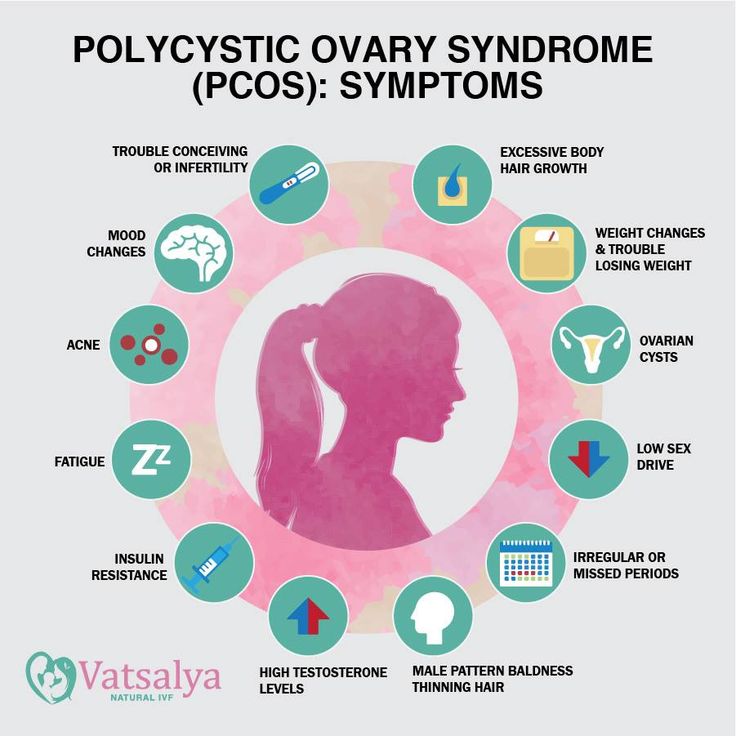 nine0041
nine0041
Treatment for PCOS
Treatment for PCOS focuses on your individual problems such as infertility, acne or obesity. Also, the direction of PCOS treatment largely depends on whether a woman is planning a pregnancy or not. Specific treatment may include lifestyle changes or medications.
How to treat PCOS?
Lifestyle changes
Your doctor may recommend weight loss through a low-calorie diet combined with moderate exercise. Even small weight loss - like losing 5 percent of your body weight - can improve your condition. Can you get pregnant with PCOS? Losing weight can also increase the effectiveness of medications your doctor recommends to treat PCOS and help with infertility. nine0019
Treatment with drugs for polycystic ovaries
To regulate the menstrual cycle, the doctor may recommend:
Combination birth control pills. Estrogen and progestin tablets reduce androgen production and regulate estrogen. Hormone regulation can reduce the risk of endometrial cancer and correct abnormal bleeding, excess hair growth, and acne. Instead of pills, you can use a skin patch or vaginal ring containing a combination of estrogen and progestin. nine0019
Hormone regulation can reduce the risk of endometrial cancer and correct abnormal bleeding, excess hair growth, and acne. Instead of pills, you can use a skin patch or vaginal ring containing a combination of estrogen and progestin. nine0019
Progestin therapy. Daily progestin may: restore normal hormonal balance, regulate ovulation, stop excessive hair growth, protect against endometrial cancer, and help get pregnant with sleep deprivation.
How to induce ovulation in PCOS? To help induce ovulation in PCOS, your doctor may recommend:
Clomiphene is a fertility medication that can help women with PCOS get pregnant.
Metformin is a drug used to treat type 2 diabetes. It also treats PCOS by increasing insulin levels.
Operation
How to get pregnant with PCOS? Surgery may be an option to improve fertility if other treatments don't work. Ovarian drilling is a procedure in which tiny holes are made in the ovary using a laser or a thin, heated needle to restore normal ovulation and the possibility of pregnancy with PCOS.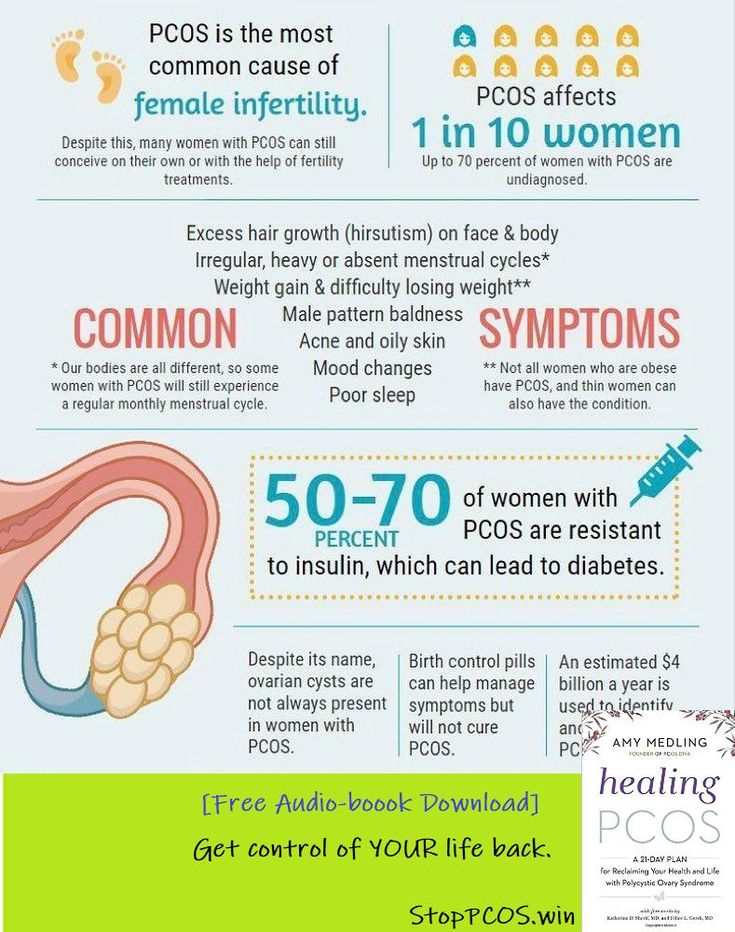 nine0019
nine0019
Important! To determine the right treatment and choose the right drug, you need to consult a doctor!
Help Doc.ua: you can make an appointment with a gynecologist-endocrinologist on the website.
I'm embarrassed to ask. I have PCOS and I can't get pregnant - what should I do?
“Hello, I would like to contact you with PCOS. I have an irregular cycle. I haven’t been able to get pregnant for seven years, doctors can’t really say anything, ”this is how the letter begins, which was sent by reader Alina to CityDog.by. nine0039
Alina writes that she was stimulated to ovulate twice, but to no avail: although she ovulated, she did not get pregnant. Alina's husband was also examined: "43% of normal spermatozoa and prostatitis - also nothing terrible, they say, they did not find it."
“They also give me hypothyroidism: I drink (here is the name of the drug, which we cannot mention. - Rev. ).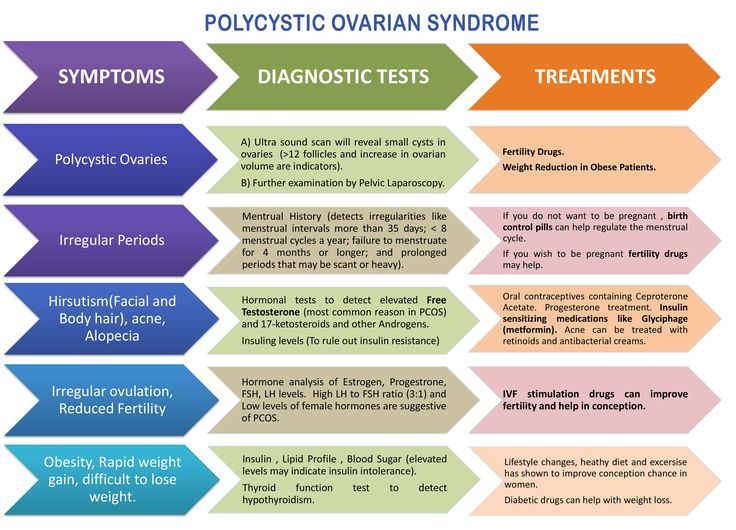 What do I need to do to get pregnant?
What do I need to do to get pregnant?
► What is PCOS?
Briefly: polycystic ovary syndrome is a complex disease, there is a whole range of symptoms. Women do not ovulate, there are hormonal imbalances, resulting in external manifestations (acne, excessive hair on the face and body) and ultimately infertility develops. nine0019
True, obstetrician-gynecologist, reproductologist Elena Novikova says that even with such a disease, women successfully bear and give birth to healthy children. We asked her to answer Alina's questions.
► How often do women in Belarus get this diagnosis?
Elena Novikova
obstetrician-gynecologist, reproductologist, candidate of medical sciences
– In my opinion, we have a kind of overdiagnosis: very often women come with controversial cases. For example, when a woman ovulates regularly, although later than with a normal 28-day cycle, the cycle itself is long, about 35 days. nine0019
Another option is an elevated prolactin level.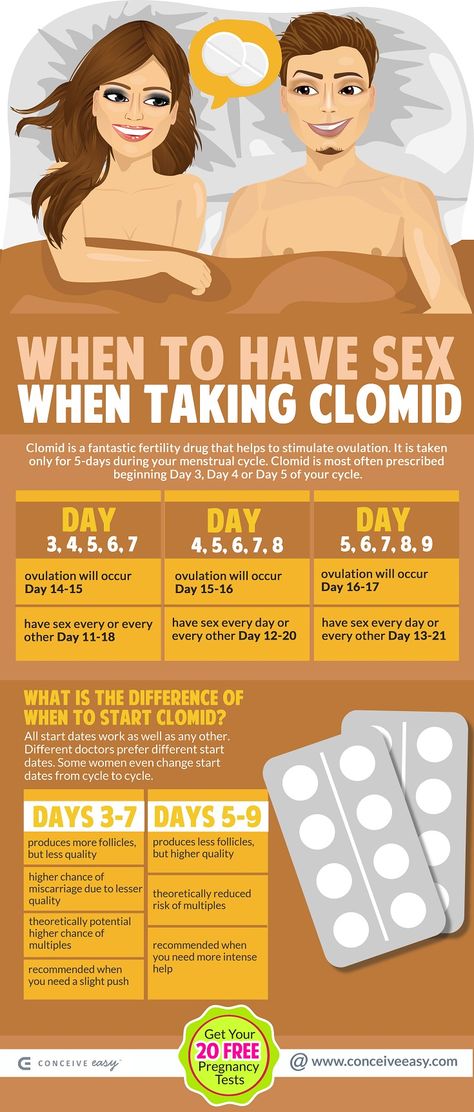 In this case, the ovaries during ultrasound look the same as with polycystic disease, there is no ovulation. But if we normalize the level of this hormone, then everything will be in order for her - this is not polycystic ovary.
In this case, the ovaries during ultrasound look the same as with polycystic disease, there is no ovulation. But if we normalize the level of this hormone, then everything will be in order for her - this is not polycystic ovary.
In general, every tenth woman faces this diagnosis when planning a pregnancy and every fifth woman in case of infertility.
► Can infertility caused by PCOS be cured?
– A large meeting of gynecologists-endocrinologists was held in Rotterdam in 2003 – then the specialists agreed on how to make this diagnosis. But in fact, the debate is still going on, this is such a complex problem. nine0019
In order to start treatment for polycystic ovaries, you need to decide whether a woman still has polycystic disease or not. And here you need to pay attention to three important criteria: if two of them are observed, then the diagnosis of "polycystic" will be confirmed.
By the way, read on the topic: "It's a shame that you are 23, and your chin is in black, coarse hair.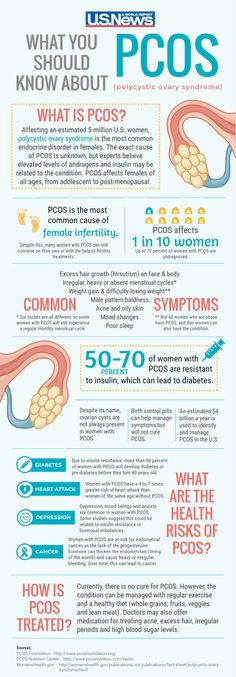 " A reader sent a desperate letter about an illness that doctors cannot help her with. Typically, the menstrual cycle lasts from 21 to 35 days, and menstruation lasts more than two, but less than seven days. nine0019
" A reader sent a desperate letter about an illness that doctors cannot help her with. Typically, the menstrual cycle lasts from 21 to 35 days, and menstruation lasts more than two, but less than seven days. nine0019
We can suspect polycystic disease if menstruation is rare and scarce - the interval between them is more than 35 days - or is completely absent. This happens because there is no ovulation in the ovaries, the follicle does not mature there.
The second symptom is excessive levels of male sex hormones, which have external manifestations: acne in hormone-dependent areas (cheeks, chin, upper chest, upper back), excessive hair on the face and body, hair loss on the head (alopecia). Or we see an increase in the level of male sex hormones in blood tests. nine0019
The third symptom - the volume of the ovaries on ultrasound is more than 10 cm 3 , they have a large number of small follicles - more than 12 in each. But at the same time, there are no signs of ovulation with a dominant follicle.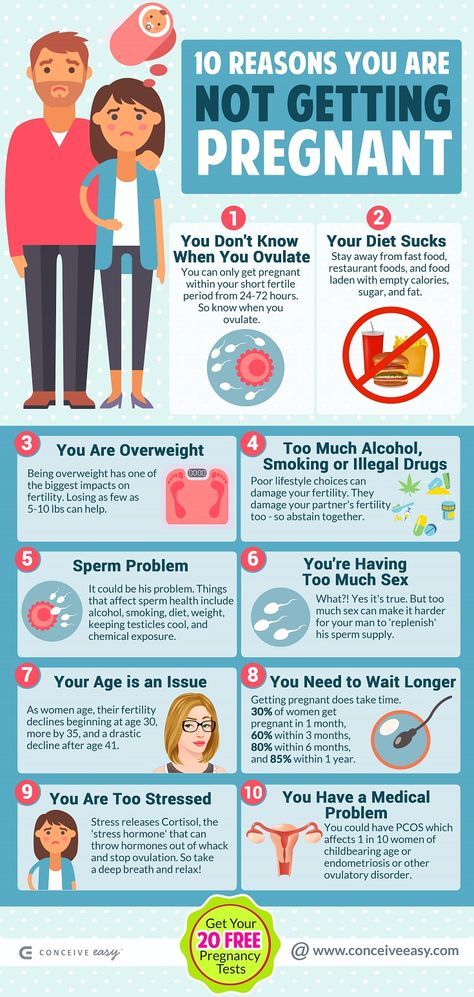
If a doctor has found two of these signs in a woman, it is necessary to start treatment for polycystic disease. And here tactics can be different depending on whether the patient is planning a pregnancy or not.
If pregnancy is not planned , then, as a rule, the woman is concerned about external manifestations. And here you need to decide what to correct in the first place. If you are overweight, then proper nutrition is selected, drugs are prescribed, which, when taken, normalize the absorption of glucose. Such therapy will have a beneficial effect on the work of the ovaries, external manifestations will go away. nine0019
Another treatment option that may be suitable for a woman who is not planning a pregnancy is contraceptives, which contain part of the hormones with a curative effect. They will slow down hair loss on the head, remove acne, excess body hair. But in order for the effect to be noticeable, they need to be taken for a long time.
If a woman is planning a pregnancy , then the treatment in this case will be completely different.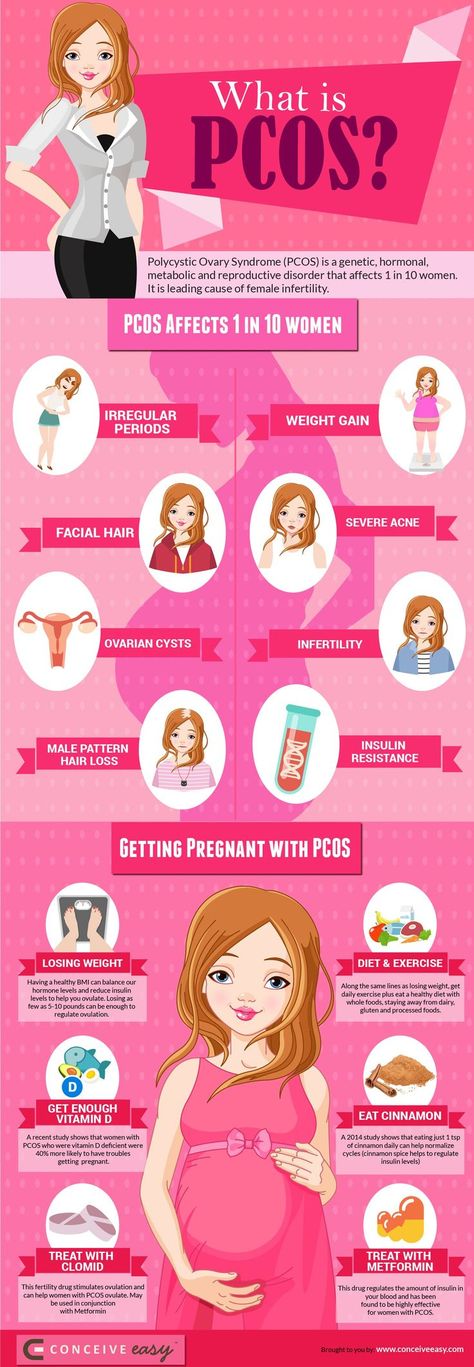 Why doesn't conception occur? Because the body does not produce an egg - there is no ovulation. So we need to make it happen. nine0019
Why doesn't conception occur? Because the body does not produce an egg - there is no ovulation. So we need to make it happen. nine0019
Since a woman with polycystic disease should have two signs out of three, the treatment scenario will again be different. For example, a patient may have anovulation and polycystic ovaries. In this case, we assign ovulation stimulation.
But therapy should only take place under the supervision of a doctor. Indeed, in this regard, there is no universal recipe, for each person an individual dose of the drug is selected: for someone it can be three tablets, and for someone - only half.
Further, under the control of ultrasound, we look at how the ovaries and the woman's body as a whole react: ovulation has appeared or not. And, after the scheme is selected, you can start an open sex life, plan a pregnancy and get pregnant.
Another treatment option would be if a woman has a change in hormone levels or low vitamin D levels, which is common with PCOS.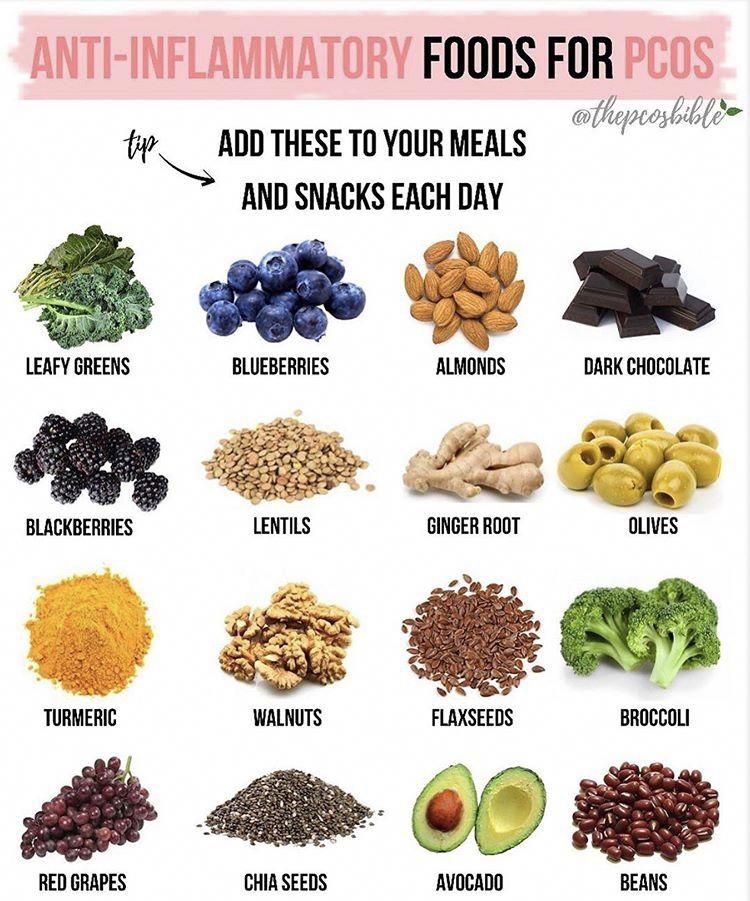 Having eliminated these symptoms, we proceed to the establishment of ovulation.
Having eliminated these symptoms, we proceed to the establishment of ovulation.
Important point: if a woman has polycystic disease, there is no ovulation, this does not mean that her husband is all right. Therefore, when planning a pregnancy, you must not forget to send your man for examination, so that with the onset of ovulation, conception occurs as quickly as possible.
Ovulation induction therapy usually lasts six months. But it happens that the effect of it does not occur: they prescribed one drug, the second - but there is no reaction. Then laparoscopy can come to the rescue when drilling is done - special holes on the ovary membrane. Thus, we destroy its capsule and part of the ovarian tissue itself. nine0019
Due to this, they decrease in volume, and spontaneous ovulation will occur within six months. For a while, the cycle will become regular. But the effect lasts only six months: if pregnancy has not occurred, you will have to resort to more radical measures - IVF.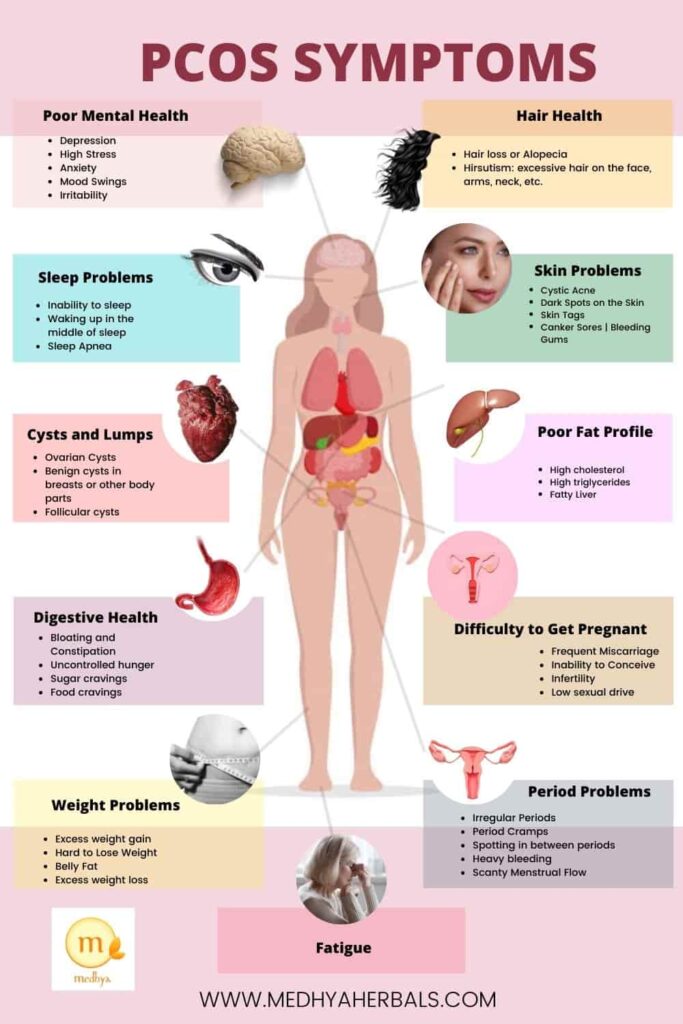
►
Does PCOS interfere with pregnancy?- The course of pregnancy with polycystic disease will be different from that of a healthy woman. If conception occurred due to the fact that we caused ovulation, then to support the function of the corpus luteum (a temporary gland that maintains pregnancy up to 12 weeks), the woman will receive progesterone preparations. nine0019
That is, it will be such a hormone-dependent pregnancy somewhere up to 12 weeks. Until the placenta is formed, these drugs will have to be taken every day.
Moreover, women with PCOS are more likely to experience miscarriage, plus they are at greater risk of developing gestational diabetes mellitus . And due to the fact that, as a rule, there is a metabolic disorder, excess body weight, then in the third trimester of pregnancy, preeclampsia may develop - an increase in blood pressure, the appearance of protein in the urine. nine0019
But in fact, if everything is controlled at every stage of pregnancy (there are no trifles here, everything is subject to control), corrected in time, then everything will be in order.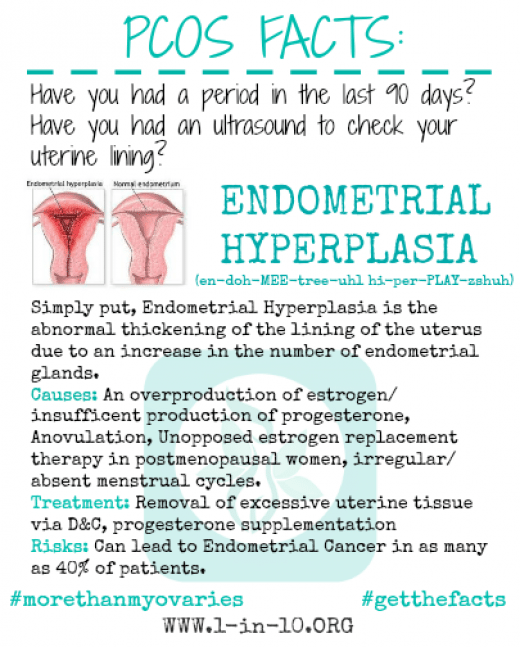
Not everything is so simple in IVF either. With polycystic ovaries, there are a lot of follicles in the ovaries, and when we prescribe stimulation, we are afraid that: a) we will not get an ovarian response or we will have empty ovaries, that is, we will not get egg hyperstimulation, b) we will get their excessive growth.
How often do women with PCOS have a successful pregnancy? nine0039
- Almost always. But this is taking into account the fact that they were actively observed by a doctor. This is exactly the situation when nothing can be left to chance.
►
Can you say for sure whether polycystic disease is inherited?- It is interesting that until now no one knows why polycystic disease appears at all. There is a theory that this is the result of inheritance: a certain mutation in certain genes.
Another theory suggests that during the establishment of the reproductive system in adolescence, some adverse factors are affected. nine0019
nine0019
The third option: adverse factors act during fetal development. And there is an opinion that secondary polycystosis occurs in those women who have had many infections of the genital area.
That is, there are a lot of different theories, but scientists cannot come to any one solution. Therefore, it is impossible to say with certainty whether polycystic disease will be transmitted to a child.
►
Does PCOS disappear after pregnancy?– Childbirth and pregnancy are, in a good way, a big hormonal shock for the body: 9there are no months of menstruation, and the ovaries, let's say, are resting. Then comes the lactation period: ovulation does not occur, but the woman has a high level of prolactin. And then, in a moment, everything stops.
And here there are two options: either the ovaries will work as expected - but there is less chance of this - or they will return to their previous dysfunction. You never know how it will be.
But there is a way out: a woman has given birth, lactation has passed - and then she may not use protection, immediately start planning a second child.